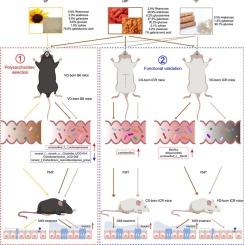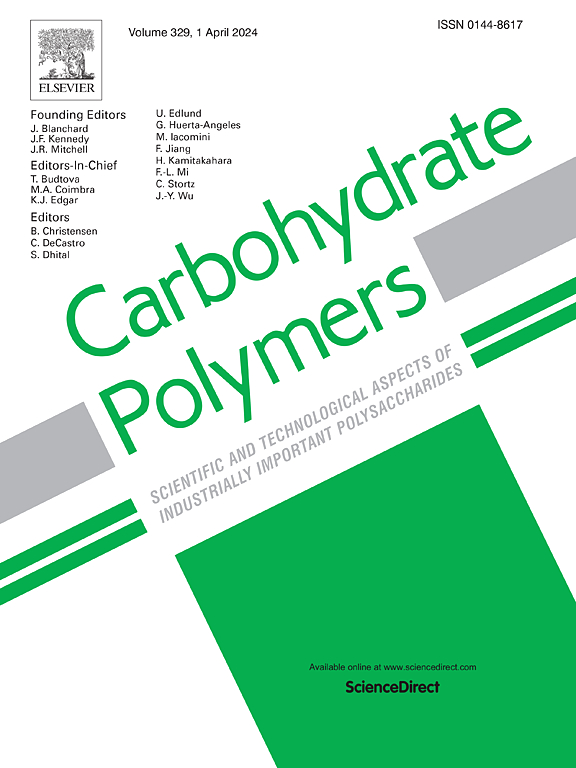枸杞、山药和向日葵多糖以结构和内在菌群依赖的方式改善结肠炎
IF 10.7
1区 化学
Q1 CHEMISTRY, APPLIED
引用次数: 0
摘要
多糖被认为可以改善代谢性疾病。然而,人们对多糖在不同菌落结构的小鼠模型中对结肠炎的不同缓解作用仍知之甚少。因此,本研究调查了枸杞多糖(LBP)、向日葵多糖(SP)和山药多糖(YP)对经阴道分娩(VD)出生的 C57BL/6 J(B6)小鼠以及剖腹产(CS)和 VD 出生的癌症研究所(ICR)小鼠结肠炎的影响。枸杞多糖主要由葡萄糖(30.2%)、半乳糖(27.5%)和阿拉伯糖(26.9%)组成。SP和YP的主要成分分别是半乳糖醛酸(75.8%)和葡萄糖(98.1%)。有趣的是,枸杞多糖能有效缓解三种小鼠模型的体重减轻、降低炎性细胞因子水平并恢复肠道屏障功能。此外,枸杞多糖还能降低 B6 小鼠中 norank_f__norank___梭状芽孢杆菌_UCG-014、Coriobacteriaceae_UCG-002 和 norank_f_Eubacterium_coprostanoligenes_group 的丰度,而这些菌属的丰度与促炎细胞因子水平呈正相关。在 CS 出生的 ICR 小鼠中,枸杞多糖增加了乳酸杆菌的丰度,而乳酸杆菌与保护因子 IL-10 的水平呈正相关。总之,我们的研究表明枸杞多糖有可能用于治疗溃疡性结肠炎。我们还提供了一种恢复 CS 出生后代肠道平衡的替代方法。本文章由计算机程序翻译,如有差异,请以英文原文为准。

Polysaccharides from Lycium barbarum, yam, and sunflower ameliorate colitis in a structure and intrinsic flora-dependent manner
Polysaccharides have been suggested to ameliorate metabolic diseases. However, their differential colitis-mitigating effects in mouse models with different colony structures remain poorly understood. Therefore, this study investigated the effects of polysaccharides from Lycium barbarum (LBP), sunflower (SP), and yam (YP) on colitis in C57BL/6 J (B6) mice born via vaginal delivery (VD) and in both caesarean section (CS)- and VD-born Institute of Cancer Research (ICR) mice. LBP was mainly composed of glucose (30.2 %), galactose (27.5 %), and arabinose (26.9 %). The main components of SP and YP were galacturonic acid (75.8 %) and glucose (98.1 %), respectively. Interestingly, LBP effectively alleviated body weight loss, reduced inflammatory cytokine levels, and restored intestinal barrier function in all three mouse models. Moreover, LBP decreased the abundance of norank_f__norank_o__Clostridia_UCG-014, Coriobacteriaceae_UCG-002, and norank_f_Eubacterium_coprostanoligenes_group in B6 mice, and the abundance of these genera positively correlated with pro-inflammatory cytokine levels. LBP increased the abundance of Lactobacillus, which was positively correlated with the levels of the protective factor, IL-10, in CS-born ICR mice. Collectively, our study suggests the potential application of LBP in the treatment of ulcerative colitis. We also provide an alternative method for restoring intestinal homeostasis in CS-born offspring.
求助全文
通过发布文献求助,成功后即可免费获取论文全文。
去求助
来源期刊

Carbohydrate Polymers
化学-高分子科学
CiteScore
22.40
自引率
8.00%
发文量
1286
审稿时长
47 days
期刊介绍:
Carbohydrate Polymers stands as a prominent journal in the glycoscience field, dedicated to exploring and harnessing the potential of polysaccharides with applications spanning bioenergy, bioplastics, biomaterials, biorefining, chemistry, drug delivery, food, health, nanotechnology, packaging, paper, pharmaceuticals, medicine, oil recovery, textiles, tissue engineering, wood, and various aspects of glycoscience.
The journal emphasizes the central role of well-characterized carbohydrate polymers, highlighting their significance as the primary focus rather than a peripheral topic. Each paper must prominently feature at least one named carbohydrate polymer, evident in both citation and title, with a commitment to innovative research that advances scientific knowledge.
 求助内容:
求助内容: 应助结果提醒方式:
应助结果提醒方式:


